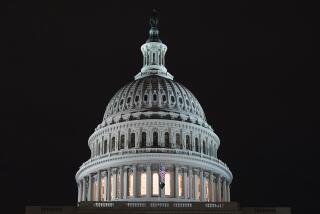Budget Accord Left Out the Hard Part: Medicare
- Share via
WASHINGTON — Lobbyists for senior citizens and business fought side by side in the recent budget battle, killing a plan to raise the Medicare eligibility age from 65 to 67 in the next century.
Their victory meant that once again Congress dodged a tough issue: how to deal with the costs of an aging society and pay the health bills for legions of rapidly aging baby boomers.
Businesses fought the proposed changes, because they feared having to pay for two extra years of health care for their retired employees out of current profits.
“There was a swift outcry, saying ‘Whoa!’ ” said R. Bruce Josten, vice president of membership policy for the U.S. Chamber of Commerce.
For some companies, it would have meant a hit of $60 million or $80 million to current earnings, he noted. Accounting standards would have required the money to be set aside now, although it wouldn’t be spent for decades.
Along with the proposal to raise the eligibility age, the budget negotiators killed a plan to require affluent senior citizens to pay more for their Medicare coverage. The proposal would have quadrupled Medicare costs for the wealthiest Americans--couples with income of more than $150,000, for example.
The elderly lobby, led by the American Assn. of Retired Persons, rebelled at the idea, even though few current retirees would have lived long enough to feel the full impact of the changes. The age of eligibility would not have reached 67 until 2027.
Although President Clinton and members of Congress boasted of their success this week in moving toward a balanced budget for the first time in a generation, they stopped short of taking any steps to grapple with the graying of America.
After dropping the controversial Medicare proposals from this week’s final budget deal, Congress and the Clinton administration kicked the controversy over to a classic Washington creation: a commission.
A new Baby Boomer Commission, with 17 members picked by the president and congressional leaders, will ponder the problem and report in late 1998 on the best ways to pay for Medicare in the future. All the choices will be painful.
“A lot of Americans will think we dodged that bullet, but all we have done is extend the trust fund solvency for 10 years--it will still go bankrupt,” warned Josten, who is co-chairman of the Coalition to Save Medicare, an alliance of business and health providers.
Business is alarmed because it has grappled with 22 payroll tax rate hikes in 28 years as Medicare became ever more costly.
“I can’t imagine the current portion of the payroll tax will be sufficient to cover” the huge increases coming in Medicare outlays, Josten warned.
Medicare is the fastest-growing federal program, accounting for about $200 billion of the $1.5 trillion budget. The budget agreement did manage to cut $115 billion in future Medicare costs by trimming payments to doctors, hospitals and health maintenance organizations, extending the program’s solvency to 2007. But a crunch is still coming.
The baby boomers will begin reaching the age of eligibility in the year 2011. Under this demographic pressure, the army of recipients will double to 76 million by 2030. Sheer numbers of people, combined with increased longevity and more expensive advanced medical technology, will generate huge increases in Medicare spending.
The bill will be paid by a society in which one in five Americans is older than 65. The question for the political system is how the cost will be apportioned among individuals, taxpayers and corporations.
Although business opposed raising the age of eligibility this time, raising it is inevitable as Americans enjoy a longer life expectancy, Josten said.
Workers are likely to stay on the job longer, he predicted.
“There will be a renewed emphasis to keep people employed,” because there will be a shortage of workers, he predicted.
The Medicare fix was simply too politically hot to handle, experts said. While senators with six-year terms voted for a higher age, the House members with two-year terms rejected the idea. It was killed in the legislative conference.
“Maybe it’s as simple as the difference between elections every six years and elections every two years,” said Edward Howard, vice president of the Alliance for Health Reform, a Washington education group.
More to Read
Get the L.A. Times Politics newsletter
Deeply reported insights into legislation, politics and policy from Sacramento, Washington and beyond. In your inbox three times per week.
You may occasionally receive promotional content from the Los Angeles Times.










